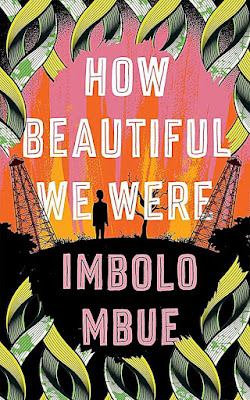“How Beautiful We Were” by Imbolo Mbue, 2022
This is the fictional story of an African village standing up to a Western oil company, Pexton, which is poisoning their land, air and water, leading to the deaths of many children. It reminds one of the actual situation on the Niger Delta, where Royal Dutch Shell, Elf, Chevron and others have ruined the wetlands with constant spills and explosions, oppressing the Ogoni people in the process. This was also the situation in Ecuador, where Chevron did the same thing in the Amazonian jungle; and in Peru, where Repsol did the extraction destruction.
Mbue herself is from Cameroon, which is just south of
Nigeria. There is an actual French/Anglo
oil company in Cameroon, Perenco. China’s Sinopec oil company bought control of
a former Shell company, Pecten Cameroon Company, in that same country. So ‘Pexton’ could be based on several of
these outfits.
The African story is told from the point of view of one
child, Thula, other children, Thula’s uncle Bongo, her mother Sahel, her grandmother
Yaya, her little brother Juba. It starts
in the 1980s. It is a very slow-moving
and somewhat lyrical village and family story set in a formerly Edenic bush
community of thatched huts, small farming, hunting and fishing named Kosawa. Now
the children die mysteriously after drinking the water; the farms cannot
produce good crops; the air is toxic from flares, leading to coughing and slow
death; the river runs green and clotted; the pipelines leak oil.
A contingent of villagers go to the local capitol, Bézam,
to try to get help and never return, including Thula’s father Malabo. There is a kidnapping motivated by the local
‘crazy’ man Konga, a massacre by soldiers in which 14 are killed, a village
chief who benefits from covering for the oil company but then switches sides
and 4 villagers hung in a legal trial by ‘His Excellency’s” government.
Another village group locates a journalist in Bézam who
tells their story to a U.S. newspaper in the ‘Great City’ of the U.S. This stimulates some Americans to form the
“Restoration Movement” that gets them a bit of money from Pexton for their
misery, while investigating the disappearance of the local men and subsequent
jailings.
The cheery side is that Thula eventually goes to the 'promised-land' in the U.S. to school, helped by the Restoration Movement. Mbue now lives in the U.S., so Thula could be based on the author. In the story, especially Yaya’s, there are echoes of slavery snatchers, missionaries condemning everyone to hell, forced rubber labor on plantations – all echoes of colonialism.
 |
| Cameroon pipeline through jungle. Familiar? |
Thula discovers that the U.S. has its own problems with
leaking oil pipelines, poisoned water and air and flooding due to carbon-based climate
change. She understands the problem is
bigger than her village. Even the Pexton
laborers are dying or being injured, while other villages have ‘oil’ problems
too. She writes back to Kosawa that they
should use sabotage against Pexton, thus countering the failed NGO reform
perspective of the Restoration Movement. She realizes the real problem is the
government of ‘His Excellency,’ which allowed this all to happen. The book
covers years of patience and impatience, the lies of Pexton and even the Restoration
Movement, fruitless meetings, magic, the buying and using of guns, talk of a
peaceful revolution, an endless lawsuit, all in the context of extraordinary
naiveté by the villagers.
Eventually Thula declares a peaceful ‘Day of Liberation”
against the dictatorial ‘His Excellency.’
Evidently there is only one activist village in a whole country, with a
simple program of getting rid of the dictator and his corporate cronies, led by
one childless woman. This is more
fictional than anything else. This book
is really a liberal story about people who try to do good, not actually a
revolutionary novel. It does show the
bind people are in when dealing with a violent state, a useless legal system, a
powerful and rich corporation. Like so
many middle-class books its true focus is the village family, though how much
interest a reader might have in them is questionable.
Does the ‘revolution’ succeed? Will Pexton and the government be brought to
heel? Or will the misery for Kosawa and
the nation continue? You can guess.
P.S. - 6/1/22 Guardian covers oil misery in Niger delta: https://www.theguardian.com/environment/ng-interactive/2022/jun/01/oil-pollution-spill-nigeria-shell-lawsuit
Prior blog reviews on this subject, us blog search box,
upper left, to investigate our 15 year archive of reviews, using these
terms: “Famished Road” (Okri); “Last Train to Zona Verde” (Theroux); “Black
Panther,” “The Convert,” “Searching for Sugar Man,” “Monsters of the Market”(McNally);
“Female Genital Mutilation,” “Secret History of the American Empire” (Perkins);
“Mandela – Long Walk to Freedom,” “The Race for What’s Left” (Klare); “Armed
Madhouse” and “Vultures’ Picnic” (both by Palast); “Party’s Over” (Heinberg);
“Oil” (Sinclair); “Tar Sands.”
And I bought it at May Day Books fiction
section!
The Kultur Kommissar
May 24, 2022



No comments:
Post a Comment